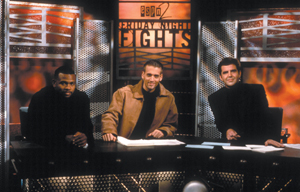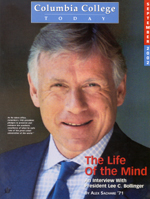 |
 |
 |
 |
|
MAX ON BOXING CONTINUED [ 2 OF 2 ] Kellerman downplays the breadth of his knowledge, saying it might not be so unusual if it were a sport other than boxing. "If someone were to say on TV that Hank Aaron holds the all-time home run record, he hit 755 home runs, no one would be that impressed," he says. "But when I get on TV and say, 'Joe Lewis has the all-time title defense record. He made 25 title defenses,' people say, 'Oh, my, he's a walking encyclopedia.' I think everyone has an encyclopedic mind for things they're interested in."
When Kellerman landed the ESPN job, many people who didn't know him were skeptical, even jealous, Raissman thinks, because he hadn't paid his dues in the traditional way - going on the road and staying in a town for a week to cover a fight. "But I thought it was a good deal," Raissman says. "He paid his dues in his own way by starting Max on Boxing." After 12 years of talking about boxing in front of the camera, Kellerman's love for the sport is undiminished. And he believes that boxing's popularity is greater than is generally thought. "There's an easy way to demonstrate it," he maintains. "If you're walking down the street and you see a guy putting a golf ball or shooting hoops, some people watch - it depends how good he is. But if two people are throwing punches, there's always a crowd. There's something that's more compelling about boxing than other sports." Kellerman postulates that it's the literal imposition of one fighter's will onto another that makes boxing so interesting, while other sports are merely surrogates for that struggle. "People love to write about boxing as metaphor, because it makes them sound deep," Kellerman says. "The compelling thing about boxing is precisely that it's not a metaphor." If it sounds like Kellerman is still debating around an oak table in a Hamilton Hall seminar room, well, he's not too far from it. "I loved Columbia," he says. (He spent one semester at Connecticut College before transferring to the College.) "In fact, I've applied stuff I learned in political science classes to boxing." The problems of boxing, a sport with no centralized authority looking out for its long-term interests, are strikingly similar to governance questions raised in Contemporary Civilization, Kellerman says. Think what you will about Kellerman's theories; he's having a blast. To prepare for Friday Night Fights, he only has to do what comes naturally: watch bouts he would be watching anyway. "I liken it to the episode of Cheers in which Norm gets a job as a beer taster," Kellerman says. "Every boxing fan is frustrated because he wants to get his opinion across, he wants to have some kind of influence on the sport. I've been put in that position and am being paid for it. It's great." On Friday Night Fights, Kenny plays the straight man, setting up Kellerman. "The format is fun," Sugar says. "Max brings that immediacy of his generation. Attracting the younger viewer is important to the lifeblood of the sport." One of the show's highlights is "To the Max," a one-minute segment, complete with clock and bell, during which Kellerman answers e-mailed viewer questions that Kenny reads. An example: "From Ray, in Berkeley, California," Kenny says. "'Max, you're full of it. What fight were you watching on Saturday? Castillo was whaling on Mayweather. The reason he didn't get hit with clean shots, as you put it, is because he runs.'" Kellerman is nodding and blinking as the question is read, then, without a second's pause, offers his response: "The fact is, if you're just sitting back, who won the fight, without scoring rounds? Castillo won the fight artistically. But when you actually sit down and score round by round, Mayweather wins the first four rounds, Castillo's got to win seven of the next eight to really win a clear-cut decision, and I don't think he did that." The segment, and the entire show, highlight Kellerman's ability to think on his feet, according to Kenny, a staunch champion of his co-host's abilities. "He brings an analysis that no one else brings to the table," Kenny says. "I've worked with everybody at ESPN doing every single sport, and there are some great analysts. But Max is the best. He brings the freshest insight, the highest level of intelligence." Friday Night Fights has evolved to include more commentary and opinion, and in the process, Kellerman and Kenny's influence has grown. Kenny says that from the start, they didn't want to lend credence to the often corrupt governing bodies of boxing, so Kellerman suggested they refuse to mention a sanctioning organization unless it was absolutely necessary. When media members gathered in Maui for a press conference with Mike Tyson before his June fight with Lennox Lewis, Tyson sparred verbally with Kellerman as other reporters stood silent. Their exchange was aired on SportsCenter, with some of Tyson's more bizarre comments making headlines around the country. The ability to elicit such comments only enhances Kellerman's profile, which continues to grow in boxing circles. "In the world of boxing, I used to read about all these characters, almost like cartoon characters," he says. "Then I pick up a boxing magazine one day, and I'm one of those characters. It's a very cool feeling." Sarah Lorge '95 is an editorial projects writer at Sports Illustrated. She lives in New York City. [ home ] |
|
|||||||||||||||||||||||||||||||||||||||||||||

